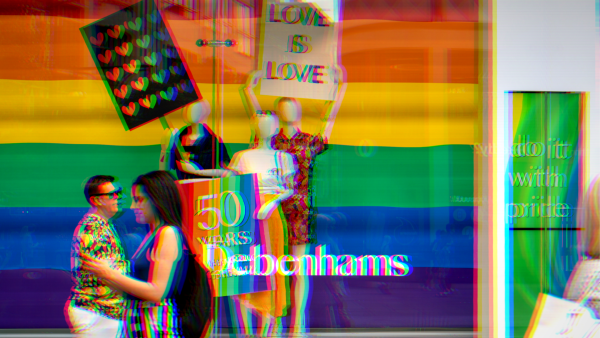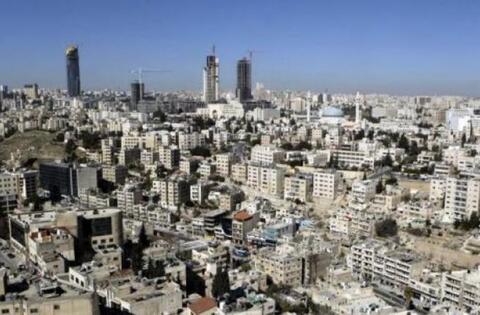During the month of June, the whole world celebrates Pride Month in support of equal rights for LGBTQ+ people. Celebrations are often featured in rainbow flags and outfits, in addition to rallies, parades, and music events in public.
Even though the COVID-19 pandemic has paused the usual events organized in different parts of the world, many people are still questioning a number of phenomena that emerge during Pride month, such as rainbow merchandise.
The rainbow has been the symbol for LGBTQ+ people since the late 1970s when the openly gay man and drag queen Gilbert Baker was looking for an official flag to represent him, thinking that the rainbow showing up in the sky is a natural symbol for the group, with "hot pink for sex, red for life, orange for healing, yellow for sunlight, green for nature, turquoise for art, indigo for harmony, and violet for the spirit".
Pride month was originally celebrated as a political movement in support of acceptance and equal rights for people with different gender and sexual orientation from those recognized traditionally.
Events held during this month whether virtually or not are meant to raise awareness of the various issues faced by members of the LGBTQ+ communities, in addition to providing individuals a chance to talk about the difficulties they face on different levels.
However, the growing popularity of this month has not been limited to the original roles it was intended for. In recent years, most global brands have started creating rainbow-themed merchandise to promote throughout Pride month, with massive discounts on shirts, flags, and other products that hold the most accepting words appreciated by the LGBTQ+ members and their allies.
This has triggered many members of the community to question whether those sales truly match brands' values in terms of supporting LGBTQ+ rights or if it is just another shopping-craze season they can profit from.
"Nowadays, Pride Month is less about making a stance for gay rights and more about being the hottest party scene in June. Musicians are using it as a leverage to gain popularity amongst an ever growing demographic - because at the end of the day, gays are treated as a demographic now, a target audience, abiding to one of the pillars of capitalist constructs. I find this a bit contradictory to our fight for assimilation rather than standing out like a sore glittery thumb" - Gay Arab Man
#PrideMonth2021 Pride was born out of protest and is so much more than a parade or a commercial opportunity. pic.twitter.com/bACRVEn67j
— Nicola Cottington ?️? (@CottingtonN) June 3, 2021
According to many members of the LGBTQ+ community, many of whom are quoted anonymously in this article, Pride months have become capitalized by many global brands that are taking the chance to market their products and reach wider audiences, without actually exerting any extra efforts to help support the community's causes.
Some voices have also questioned the way these brands choose to spend their Pride month profit, saying that true solidarity can at least be shown by channeling the millions of dollars they make during June to help queer organizations and/or members of the LGBTQ+ community, who are often struggling to find jobs or to afford to live in case they are ousted by their families.
According to a report published by the Center for American Progress (CAP) and the Movement Advancement Project (MAP), one in five LGBT women living alone ,lives in poverty.
"Pride parades, unfortunately, haven't been as inclusive as one would expect. It is led and dominated by the gay cis-men "perfect" body group. Representation of other queer groups and minorities is minimal. In addition, the fight for equal rights and visibility has lowered during Pride, hence why Black Pride is popping up as well as Trans Pride. These prides are trying to change the narrative back to fighting for everyone's equal rights, showing inclusivity and representing everyone with no exceptions."- Lesbian Non-Binary Arab Person
Meanwhile, many queer individuals have stressed the importance of embracing Pride month despite attempts to capitalize or commercialize it, saying that rainbow flags worn by LGBTQ+ people and their allies for a whole month every year have a major impact in changing the public opinion towards them and consequently help in creating more accepting environments, which can gradually help them have more equal rights and decent lives.
"Back when I lived in a country where being homosexual was a crime, I viewed pride month as a reason for people to go out, dress up, and have a good time. Now that I live in a country where homosexuality is 100% legal, my perspective has shifted. Queer couples still lack rights that straight couples are granted including but not limited to basic parental rights.
Having attended more than one pride myself, I say now with complete confidence that although some might focus on the rainbows and glitter in the air, they are missing out on the importance of the mere concept of being and feeling visible. At the end, how are we expected to fully assimilate in a society that still doesn't treat us as equal?
Just like any group that is still being treated differently, the queer community in my opinion should keep fighting the fight while celebrating who we are: humans who deserve the same rights as you do." - Bisexual Arab woman
Is Pride month celebrated in your country? What can be done to help members of the LGBTQ+ community enjoy a better life quality without taking advantage of their cause?









